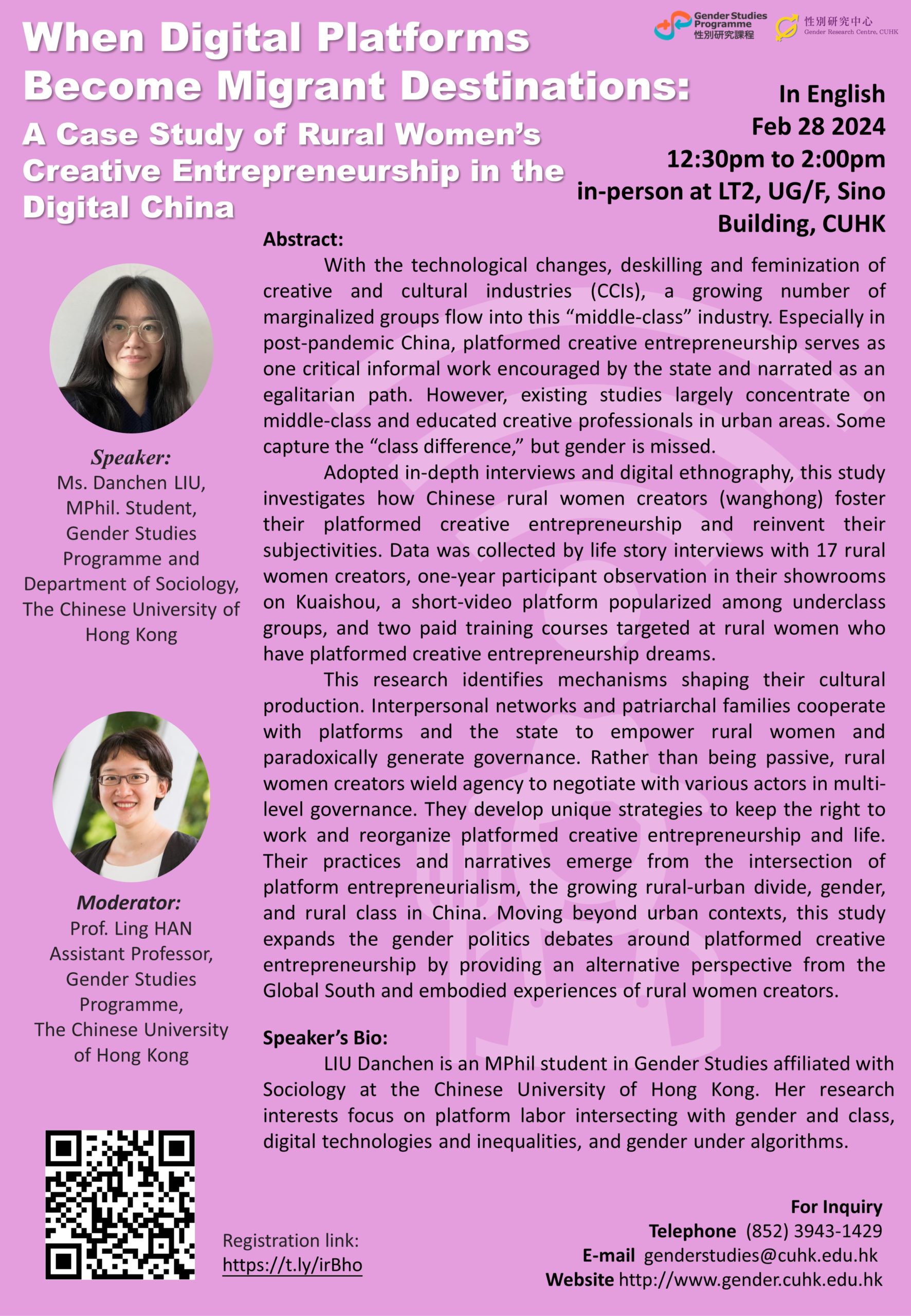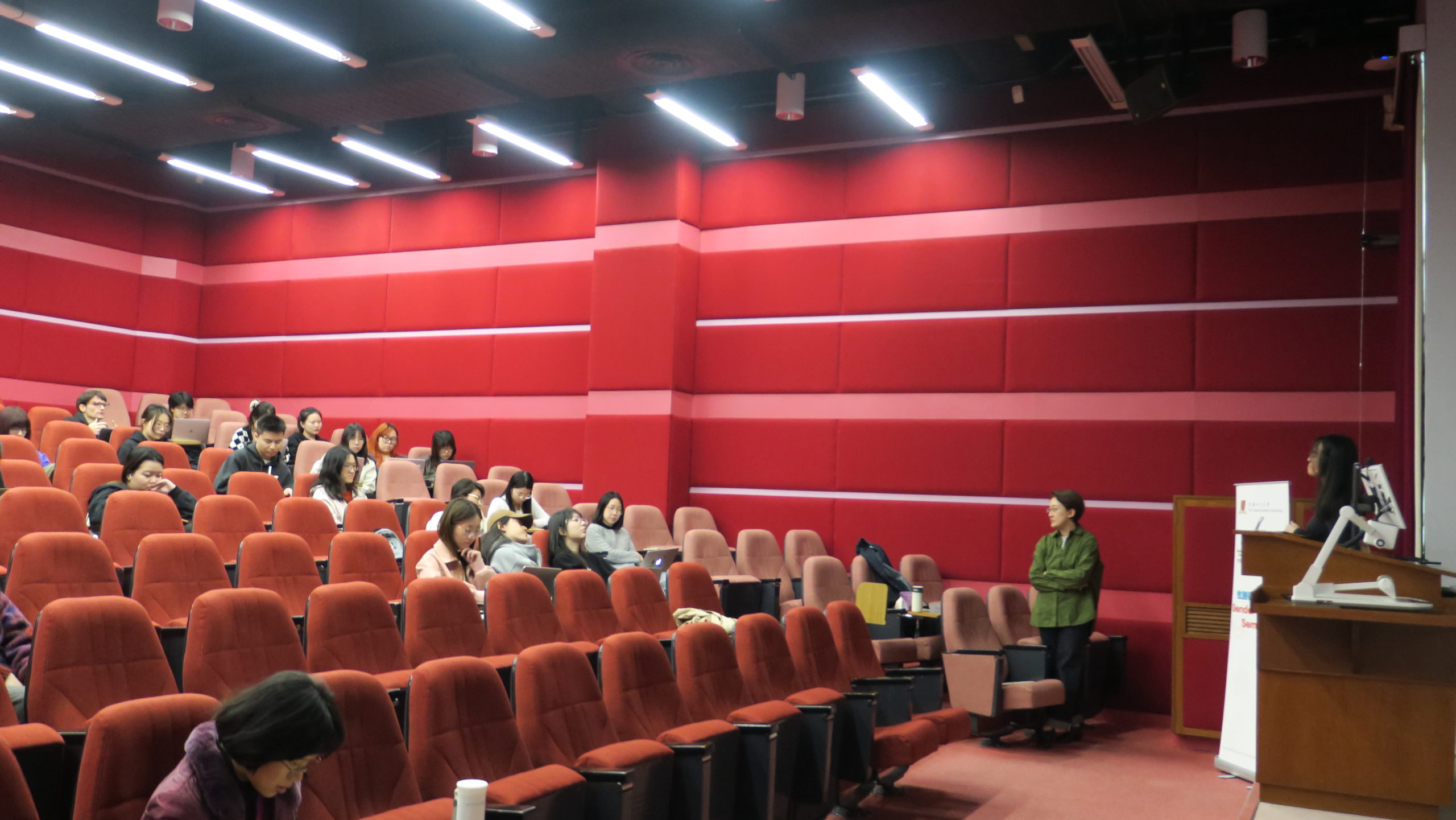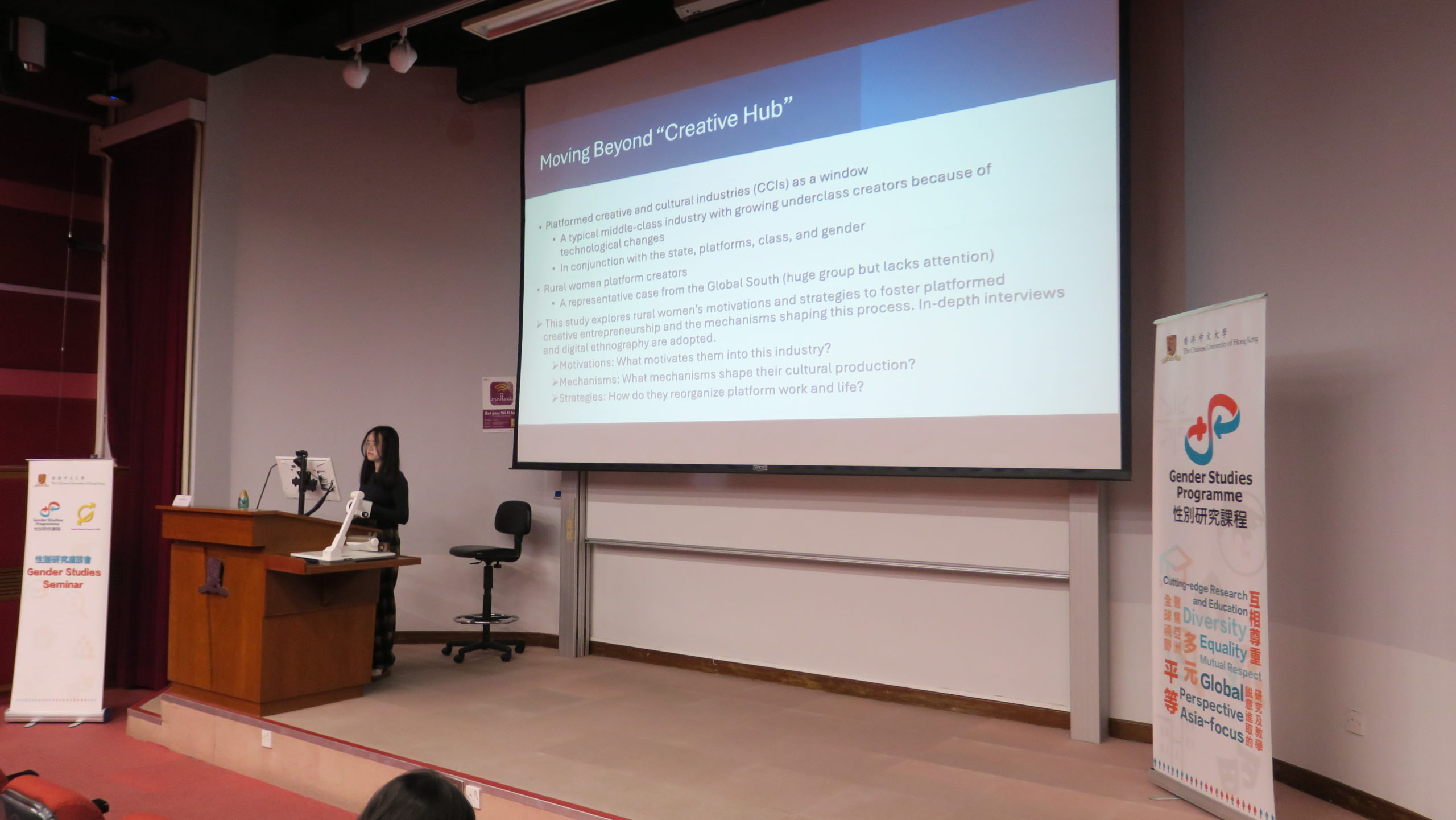Kuaishou is a popular app in Mainland China and many people record their lives in short videos on it. In this context, many rural women have begun to use short video platforms such as Kuaishou to record their daily lives and try to gain some income. Based this, the speaker proposed some research questions: What motivates them into this industry?What mechanisms shape their cultural production?How do they recognize platform work and life?
To address these questions and examine rural women’s life and work experiences, the researcher used qualitative research and interviewed 17 female creators from rural areas using in depth interviews and digital ethnography.These respondents were young mothers with at least one child. Their average age was 25.3 years and they had a low level of education. Most of them live in poor rural areas.
According to speaker, many of these rural women’s motivations for creating come from family hardship. These women see platform entrepreneurship as an economic pursuit, and short-form video creation as a supplement to paid work.In addition, some rural women choose to create short videos at home instead of going out to work because they have to stay behind to take care of their children. Some of them also suffer from an isolated and depressing married life, and creating short videos becomes a way of self-comfort or self-actualization for them.
Besides, triple governance shapes platform engagement.Family, interpersonal social networks and platform governance shape the expression of rural women creating short videos. The pressure of social networks of acquaintances, the state and platforms’ desire to spread positive energy all require progressive, happy short video content. These deny the plight of rural women and constrain their platform participation. This individualizes structural inequalities.
Many rural women also face the problem of reorganizing their work and life.Blurring production and reproduction work is one.When shooting short videos does not conflict with women’s work and even generates profit. They regain confidence from being mothers with extra income.But this sometimes exposes them to cyber violence. In addition. they will have tighter schedules to work and allocate their time outside the patriarchal vision in the process.Time squeezing and hustling at the periphery are problems. In addition, speakers briefly discussed how to reorganize work and life and suggested directions for further research in the future.
In conclusion, this study examines rural women’s motivations and strategies for promoting platform-based creative entrepreneurship and the mechanisms that shape this process.
撰文:ZHANG, Zheting
在本次研讨会上,性别研究项目的研究型硕士刘丹琛分享了她毕业论文研究:《当数字平台成为务工目的地——数字中国农村女性创新创业案例研究》。本研究聚焦于快手平台,探讨了农村女性参与平台型创新创业的动机、机制和策略。该研究结合质性研究与解释性研究,通过与17名农村女性内容创作者的深度生活故事访谈以及在快手直播间和微信群组的线上课程中的数字人种志收集数据,回答了什么促使农村女性进入数字平台行业,什么机制塑造了她们的文化生产,及她们如何重组平台工作与生活三个问题。
首先,性别化的家庭模式是农村女性进入数字平台的根本原因。家庭贫困是农村女性的普遍困境,同时她们也受困于照顾孩子或“生男孩”的压力,家庭生活孤独压抑,并且需要向丈夫要钱来生活,没有办法走出去。因此,她们选择在快手通过视频记录生活,从而赚取额外的生活费,排解生活的苦闷。
其次,家庭和人际关系是农村女性的主要文化生产内容,亦可分为正能量家庭生活和家庭冲突两个方向。很多农村女性内容创作者及其家人出于面子,或是平台及国家层面对正能量的推动,会着重于分享正能量的家庭生活,而不愿意展示出家庭冲突的部分。但一些农村女性创作者仍会分享家庭冲突的经历,试图展现出真实的生活。值得一提的是,正能量导向和人际关系压力可能会无意间抹去农村女性最真实的生活悲剧,这是一个棘手的问题。
最后,农村女性内容创作者重组平台工作和生活,使视频记录成为了日常生活的一部分,模糊了生产与再生产的界限。但这也使得她们的生活变得异常繁忙,她们需要在家务与农务之余,见缝插针的完成平台运营。
综上所述,农村女性内容创作者在忙碌中探寻着属于自己的主动权。
撰文:LI, Ang
關於本次講座「當數字平臺成爲移民目的地——數字中國農村婦女創新創業案例研究」,研究者的研究緣起是由於技術變革,平臺化創意文化產業湧現出了很多底層創造者,其中農村婦女作爲南方世界的一個代表性案例,群體龐大但缺乏關注。所以此研究探討了農村婦女促進平臺型創新創業的動機和策略,以及形成這一過程的機制。
研究者先是解釋了「記錄日常生活」此種視頻類型的流行原因以及爲什麽選擇「快手」平臺,並理論角度切入,分析平臺管控、后女權主義對於平臺型創新創業的影響。她提到在中國,邊緣化的群體借由國家與互聯網平臺之間的關聯來進行符合社會導向的文化輸出,進而實現流量扶貧。但這其中也暴露出了很多諸如性別不平等、階級立場、父權影響和平臺限制的現象。研究者采取了深度訪談和數字人種志的研究方法來收集數據與分析,將創作動機總結爲家庭經濟困難、婚姻生活的壓迫、有限的謀生選擇三類。
何種機制塑造了她們的文化創造?研究者認爲是家庭、人際社交網絡與平臺管控的相互作用。正能量的話語導向、結構性不平等個體化與隱藏家庭悲劇來表現幸福、淡化個人奮鬥使農村女性的悲劇消失在大衆視野中。
針對於此,她們如何重組平臺工作與生活?研究者提出「忙碌女權主義」概念,通過模糊製作與複製工作、壓縮時間來進行忙碌的實踐,超越了剝削與自我剝削,爲了走向幸福和更多可能性。
最後,關於未來的研究方向,研究者提到要將社會生產、階級問題、更多實證研究融合進來。
撰文:LI, Yushan





A
A
A
聯絡我們